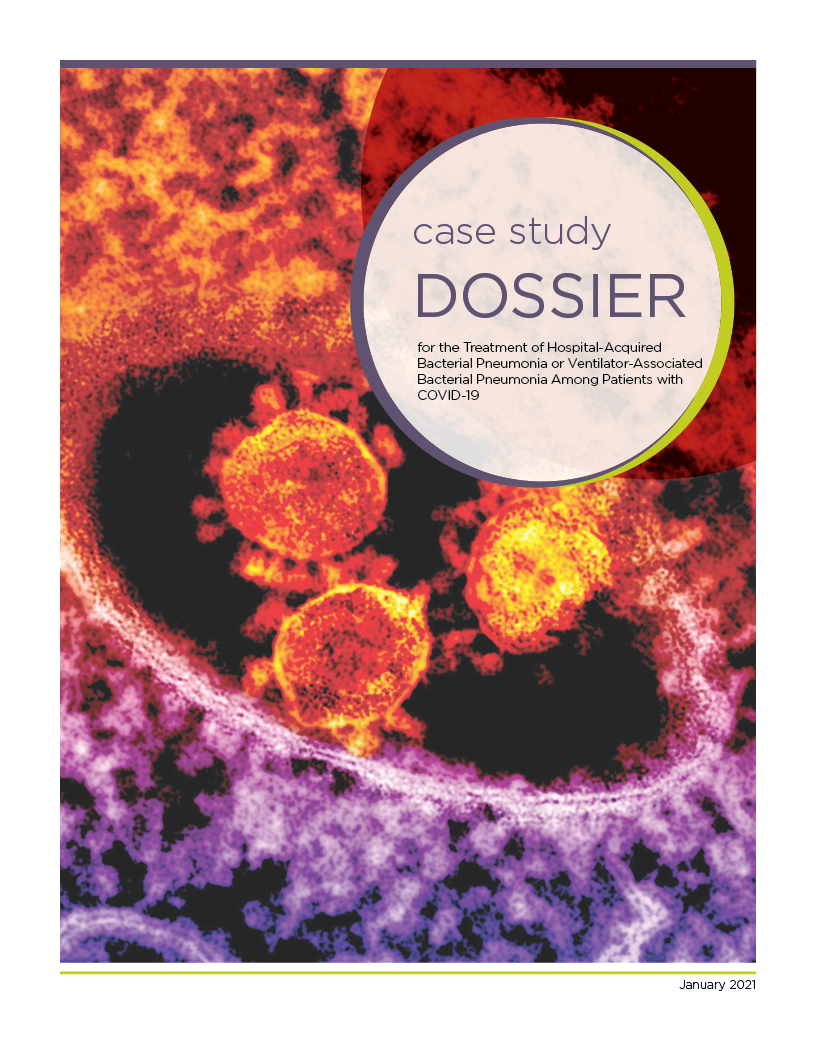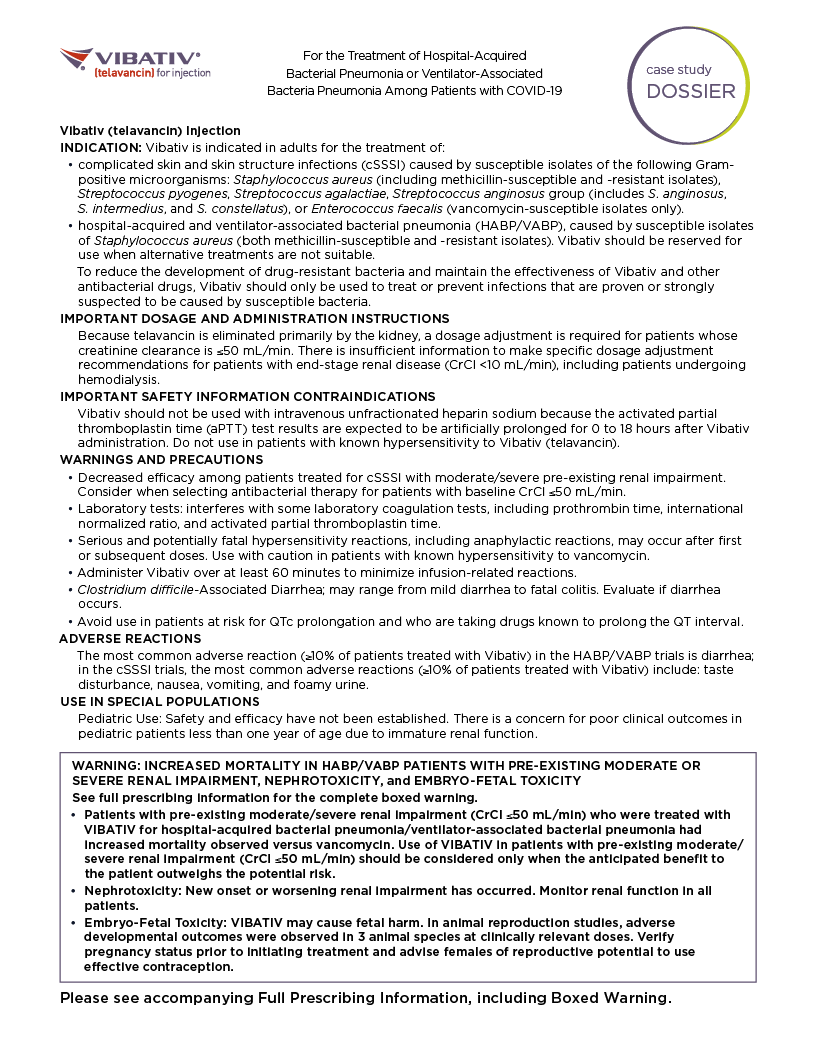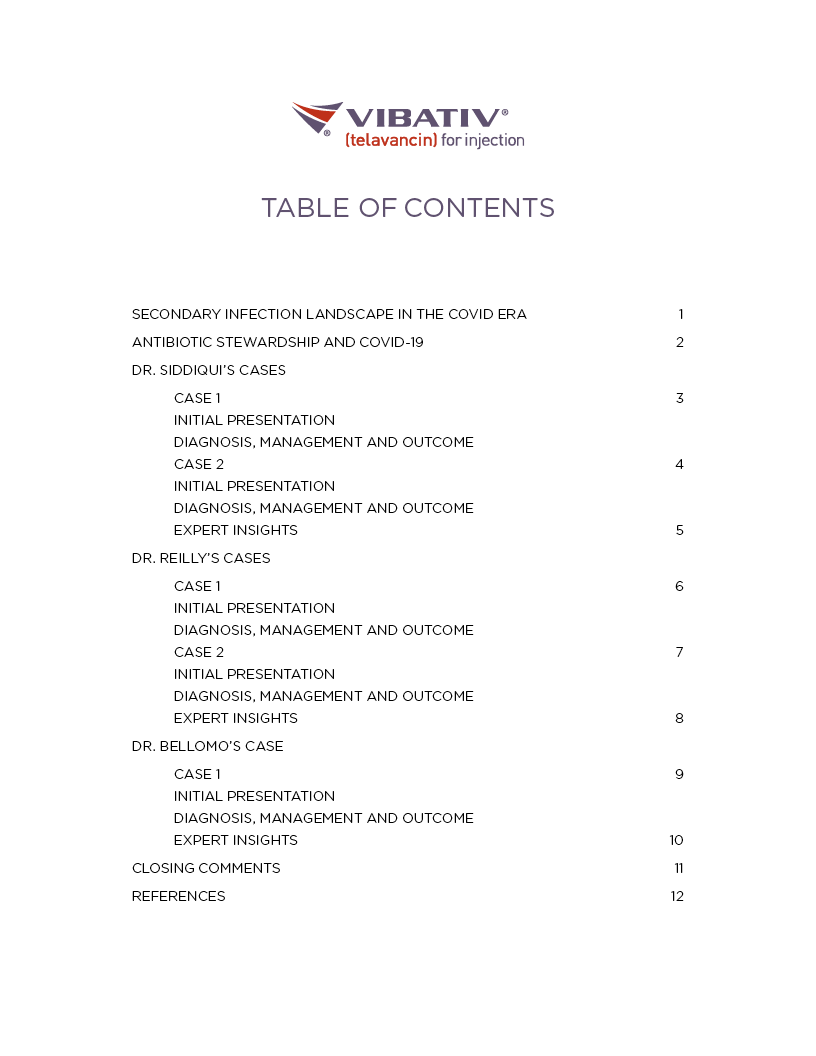



PLEASE SEE FULL PRESCRIBING INFORMATION INCLUDING BOXED WARNING
VIBATIV (telavancin) Injection
INDICATION: Vibativ is indicated in adults for the treatment of:
- complicated skin and skin structure infections (cSSSI) caused by susceptible isolates of the following Gram-positive microorganisms: Staphylococcus aureus (including methicillin-susceptible and -resistant isolates), Streptococcus pyogenes, Streptococcus agalactiae, Streptococcus anginosus group (includes S. anginosus, S. intermedius, and S. constellatus), or Enterococcus faecalis (vancomycin-susceptible isolates only).
- hospital-acquired and ventilator-associated bacterial pneumonia (HABP/VABP), caused by susceptible isolates of Staphylococcus aureus (both methicillin-susceptible and -resistant isolates). Vibativ should be reserved for use when alternative treatments are not suitable
To reduce the development of drug-resistant bacteria and maintain the effectiveness of Vibativ and other antibacterial drugs, Vibativ should only be used to treat or prevent infections that are proven or strongly suspected to be caused by susceptible bacteria.
IMPORTANT DOSAGE AND ADMINISTRATION INSTRUCTIONS
Because telavancin is eliminated primarily by the kidney, a dosage adjustment is required for patients whose creatinine clearance is ≤50 mL/min. There is insufficient information to make specific dosage adjustment recommendations for patients with end-stage renal disease (CrCl <10 mL/min), including patients undergoing hemodialysis.
IMPORTANT SAFETY INFORMATION
CONTRAINDICATIONS
Vibativ should not be used with intravenous unfractionated heparin sodium because the activated partial thromboplastin time (aPTT) test results are expected to be artificially prolonged for 0 to 18 hours after Vibativ administration. Do not be use in patients with known hypersensitivity to Vibativ (telavancin).
CONTRAINDICATIONS
WARNINGS AND PRECAUTIONS
- Decreased efficacy among patients treated for cSSI with moderate/severe pre-existing renal impairment. Consider when selecting antibacterial therapy for patients with baseline CrCl ≤50 mL/min.
- Laboratory tests: interferes with some laboratory coagulation tests, including prothrombin time, international normalized ratio, and activated partial thromboplastin time.
- Serious and potentially fatal hypersensitivity reactions, including anaphylactic reactions, may occur after first or subsequent doses. Use with caution in patients with known hypersensitivity to vancomycin.
- Administer Vibativ over at least 60 minutes to minimize infusion-related reactions.
- Clostridium difficile-Associated Diarrhea; may range from mild diarrhea to fatal colitis. Evaluate if diarrhea occurs.
- Avoid use in patients at risk for QTc prolongation and who are taking drugs known to prolong the QT interval.
ADVERSE REACTIONS
The most common adverse reaction (≥10% of patients treated with Vibativ) in the HABP/VABP trials is diarrhea; in the cSSSI trials, the most common adverse reactions (≥10% of patients treated with Vibativ) include: taste disturbance, nausea, vomiting, and foamy urine.
USE IN SPECIAL POPULATIONS
Pediatric Use: Safety and efficacy have not been established. There is a concern for poor clinical outcomes in pediatric patients less than one year of age due to immature renal function.
This product includes the following Boxed Warning:
WARNING: INCREASED MORTALITY IN HABP/VABP PATIENTS WITH PRE-EXISTING MODERATE OR SEVERE RENAL IMPAIRMENT, NEPHROTOXICITY, and EMBRYO-FETAL TOXICITY
Patients with pre-existing moderate/severe renal impairment (CrCl ≤50 mL/min) who were treated with VIBATIV for hospital-acquired bacterial pneumonia/ventilator-associated bacterial pneumonia had increased mortality observed versus vancomycin. Use of VIBATIV in patients with pre-existing moderate/severe renal impairment (CrCl ≤50 mL/min) should be considered only when the anticipated benefit to the patient outweighs the potential risk.
- Nephrotoxicity: New onset or worsening renal impairment has occurred. Monitor renal function in all patients.
- Embryo-Fetal Toxicity: VIBATIV may cause fetal harm. In animal reproduction studies, adverse developmental outcomes were observed in 3 animal species at clinically relevant doses. Verify pregnancy status prior to initiating treatment and advise females of reproductive potential to use effective contraception.

PPO1300123
